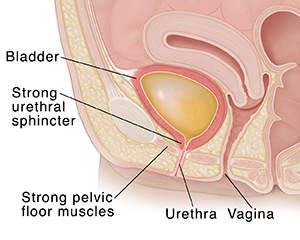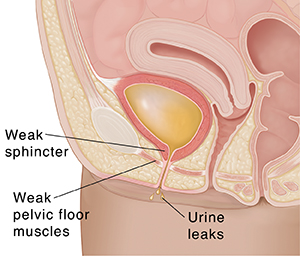What Is Stress Urinary Incontinence?
Stress urinary incontinence is a common type of bladder control problem in people who were assigned female at birth. It happens less often in people who were assigned male at birth, and due to different reasons. It occurs when urine leaks out when there is sudden pressure on the belly (abdomen). This condition may occur when the structures that help hold urine in your bladder are weak.
What are the symptoms of stress incontinence?
If you have stress incontinence, you may leak low to moderate amounts of urine when you:
Normal urine control
The bladder holds urine until you're ready to let it flow out. These structures help:
-
The pelvic floor muscles and connective tissue. These help hold the pelvic organs in place. When the muscles and connective tissue are strong, the urethra and bladder are well supported. This helps keep the urethra closed. Then urine doesn’t leak.
-
The urethral sphincter. This is a band of muscles around the urethra. When these muscles are strong, they keep urine in the bladder. These muscles relax when you want urine to flow out.
 |
| Strong pelvic floor muscles and connective tissue, and a strong urethral sphincter, help keep urine in the bladder. |
If urine leaks out
The pelvic floor muscles and connective tissue may stretch, weaken, or tear. Weak or torn structures can’t support the urethra and bladder. The urethral sphincter may also weaken. These changes can cause urine to leak. The changes may be caused by:
-
Pregnancy and vaginal or cesarean section delivery
-
Constant coughing (such as with bronchitis or smoking)
-
Being overweight or obese
-
Hysterectomy or other pelvic surgery
-
Nerve damage
 |
| Weak or torn pelvic floor muscles and connective tissue, or a weak urethral sphincter, can let urine leak out of the bladder. |
Treatment
Many treatments are available, including:
-
Lifestyle changes (reducing weight, quitting smoking, reducing drinks with caffeine or alcohol, and doing bladder-strengthening exercises)
-
Surgery
-
Medical devices such as pessaries
© 2000-2024 The StayWell Company, LLC. All rights reserved. This information is not intended as a substitute for professional medical care. Always follow your healthcare professional's instructions.